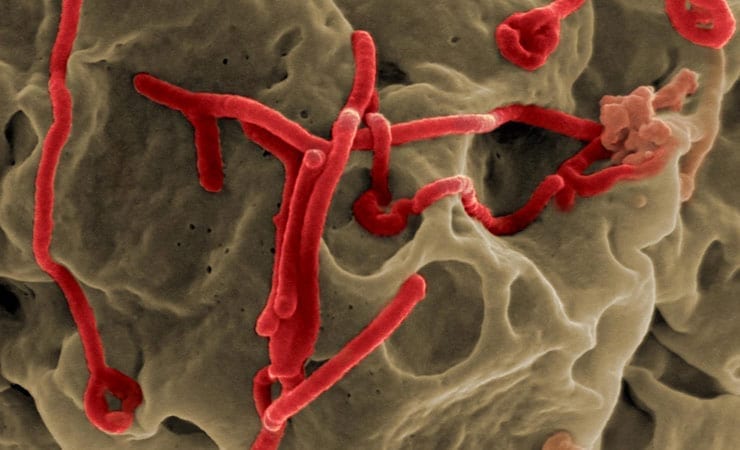One of the most lethal Ebola strains is the Sudan ebolavirus (SUDV). Although not the strain currently devastating West Africa, SUDV has caused widespread illness, even as recently as 2012.
In a new study appearing in the journal ACS Chemical Biology, researchers now report a possible therapy that could someday help treat patients infected with SUDV.
John Dye, Sachdev Sidhu, Jonathan Lai and colleagues explain that about 50-90 percent of Ebola patients die after experiencing the typical symptoms of the disease, which include fever, muscle aches, vomiting and bleeding.
Of the five known ebolaviruses, the Zaire (EBOV) and SUDV strains are the most deadly and cause the most recurring outbreaks. Many studies have focused on EBOV, the culprit of the current epidemic, but much less attention has been placed on SUDV until now. To develop a therapy for SUDV, this research team turned to an antibody that Dye’s group previously reported.
The team’s antibody was directed against SUDV and was made in mice. But the human immune system could potentially recognize that antibody as foreign and ultimately get rid of it, preventing the antibody from treating the disease. To avoid this situation, they wanted to make a “humanized” version of the antibody.
In the newly published work, the team put the ebola-specific part of the mouse antibody onto a human antibody scaffold and made some changes to this molecule. They identified two versions that were able to fend off SUDV in laboratory tests on cells and in specially bred mice. “These antibodies represent strong immunotherapeutic candidates for the treatment of SUDV infection,” say the researchers.
This research, however, isn’t expected to help with the current ebola outbreak that, as of mid-August, has killed at least 1,200 people. That’s because antibodies that kill off one strain of the virus haven’t worked against other strains. The U.S. Food and Drug Administration — which has not yet approved any ebola therapies — did allow two U.S. aid workers infected during the current outbreak to be treated with an experimental drug, which is a cocktail of antibodies specifically targeting EBOV.
The research received funding from the National Institutes of Health, the Canadian Institutes for Health Research and the Defense Threat Reduction Agency.
Read the study at ACS Chemical Biology: Synthetic Antibodies with a Human Framework That Protect Mice from Lethal Sudan Ebolavirus Challenge.
Source: American Chemical Society, adapted. Image courtesy of NIAID.



